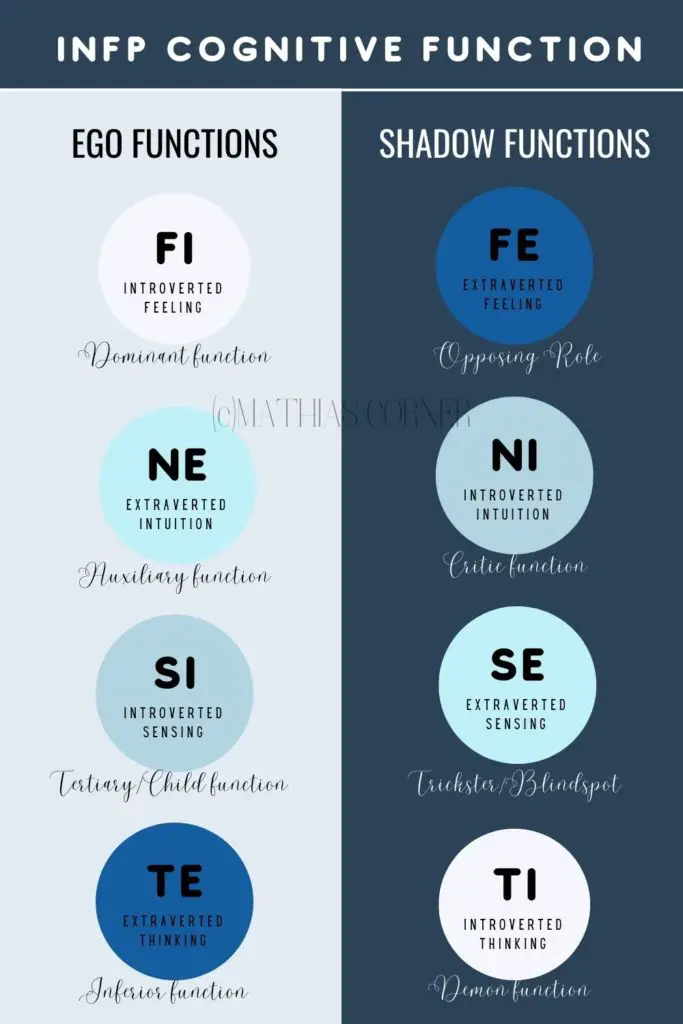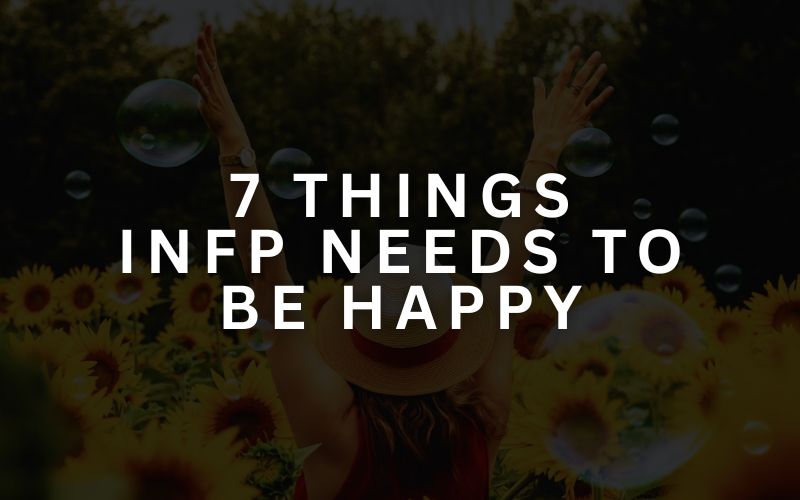Just like the others, many INFPs carry heavy baggage in their lives — uncertainties, or fears perhaps. Not to mention, some even loathed themselves for being too emotional, unfocused, and a quitter. And if you ask me if I ever experienced the same, I am not gonna lie; I’d be raising both hands. That’s me! I’m that INFP.
Truly, being an INFP is not easy. Finding a place in this loud world? Even harder.
However, don’t get the wrong idea. Although INFP is stereotyped as a “sad personality,” INFPs undeniably live blissful, colorful moments, too! Of course we know how to have fun.
Only that, as heavy Feelers, we may be stuck in the rabbit hole of our purpose and existence. And the worst part during deep self-reflection? It’s when we couldn’t grasp an answer yet.
Who am I? Where do I fit? Why am I like this? Why can’t I be happy like the others?
If you dwell on this series of questions, too, I hope this post can give you a direction.
I spent most of my early 20s questioning myself, too. Thankfully, I got out of that rut and wanted to share my perspectives with those who needed to know it.
Here are 7 things INFPs need to be happy and find long-term fulfillment in life.
Ready? Here we go:
7 Things INFPs Need To Be Happy (And Be Ultimately Fulfilled in Life)
1. A space to freely express their ideas
As an INFP, isn’t it a compliment to be called a “Dreamer?”
INFPs received this moniker not only to describe their daydreaminess, but to express a strong, unyielding character — being passionate visionaries. Because of their introverted Feeling (Fi) and Extraverted Intuition (Ne) functions, INFPs eagerly expand their imagination, delivering in a way closest to what they genuinely feel. Pretty much poetic.
With that said, it should be obvious. Expressing their brewing visions (Ne) gives them a sense of purpose. A duty.
INFPs desire to actualize their plans even without anyone dictating them. They’re drawn to try and try despite their unsupportive environment. They find ways to be creative, even to the point of keeping their ideals a secret.
This is one trait INFPs shouldn’t take lightly. Their idealism, visions, and creativity must be expressed, or else it agitates them.
When an INFP is halted with their exploration, it strips them of their satisfaction.
An INFP whose suppressed of freedom to explore (by their parents, partners, colleagues, and bosses) either becomes quietly rebellious or just one day bursts, breaking down into despair and depression. They may feel useless. Purposeless. Caged.
I agree INFPs can be sometimes irrational. But figuring things out on their own is part of their growth.
If you truly want to be happy, you have to find—or even create—a place where you can have opportunities for discovery, learning, and creativity.
Let’s start the search for happiness there.
2. A life aligned with their strengths and values
Although I presented INFP’s booming minds as an advantage, actually, there’s a caveat. The truth is, with a wide range of ideas bombarding their minds, recognizing the life that truly aligns with their values is far from simple.
You see, INFPs may start new ventures, only to leave after a short period. The excitement often dies down, and disappointment follows. Despite their earnest efforts, only a few of their plans resonates deeply with their hearts.
That said, I wanted to emphasize how INFPs must seek the “life aligned with their values” and not simply “the life they want.” Considering how INFPs want a lot of things, it’s chaotic!
With so many paths to take, how can an INFP be happy? How can we find the life truly aligned with our values?
The answer circles back to our initial discussion: exploration.
It seems slow progress. But as they gradually examine and experience different walks of life, valuable lessons were gathered, wisdom is deepening, and their true strengths become more evident.
It may be daunting not to have a clear sense of identity in the present moment. But once you’ve journeyed enough, your wisdom inevitably evolves.
That said, do not allow unnecessary opinions to deter you from exploring. Many people say, “focus on one!” Well, that’s true. Most success is the result of focusing on one, so I place this rule on high regard.
But for INFPs just starting out, it’s not the go-to path. For INFP who still can’t figure out which “one” to focus on, exploration is a must. You have to test the waters, especially in your younger years.
Only after identifying what resonates with you can we welcome the idea of “focus” and “mastery.”
If you want to be happy and find your direction, you need to take a peek at the other paths first. Weigh which one resonates the most, and build not according to your ever-changing feelings, but to your true strengths, gifts, and values.
Related Post: How Can INFP Gain “Mastery” Despite the Distractions?
3. Find your tribe.
INFPs need true friends where they can be themselves without fear.
See, INFP’s dominant function is introverted Feeling (Fi), which translates to our personal morals and authenticity. But just across it is the first shadow function, Fe Villain, which pertains to ethics and social harmony.
Although our Fe is placed at the 5th cognitive spot, a.k.a. the Villain or Opposing Role, it doesn’t mean it has to antagonize our personal morals forever. Truth is, INFPs tread back and forth between this two. They value social harmony alongside their individual convictions.

You care about others’ principles. Yet, your authenticity tugs you, too. With contradicting beliefs, INFPs find it hard to reconcile, making their whole experience a spiral between being lost and misunderstood.
But on the contrary, when these gentle souls surround themselves with people who agree (Fe) with their morals (Fi), they find comfort and peace – mentally and emotionally.
Truly, common ground and the sense of “belongingness” brings forth happiness to people.
Remember the quote, “If you want to walk fast, walk alone; if you want to walk far, walk with others”?
Depending on our goal, walking alone often appeals to an independent INFP. However, from my experience, although I liked being alone in the first three years of being a writer, my fourth year now unsettles me.
Not because I disdain solitude, but because I’ve realized how growth necessitates interaction with people. Through connecting, we are challenged, inspired, and provided with opportunities for learning and self-discovery, and also emotional support.
After several years in isolation, I’m grateful I didn’t completely cut ties with people. Who would’ve thought it’s fun to talk to old acquaintances, even the ones who used to annoy me. They’ve matured just like we have.
Moreover, my partner and I discussed on expanding our social circles as well. We’ve bid adieu to fake friends, strengthened the relationship with the true ones, and welcome new, casual friendships.
I’ve understood that being a lone wolf has advantages, but so is keeping our connections intact. I did many things on my own, but there’s so much more fulfillment when I have them by my side, pursuing the same goals.
For INFPs to be happy long-term, we must strike a balance between independence and making an effort to connect with others.
Pursuing authenticity is a need, and so is finding our tribe.
Related Post: 4 Reasons Why INFPs Don’t Easily Fit In
4. Freedom from overthinking
Being trapped in a cycle of overthinking? Definitely overwhelming.
There may be lots of advice on how to defeat these lingering unwanted thoughts. But if you ask me, the best way to counter INFP’s overthinking involves strengthening our Extraverted Thinking (Te) function.
While Feelers like INFPs often feel tossed around by their ever-changing emotions, Thinkers, on the other hand, are more black and white — making clear, direct choices.
The good thing is, Te inferior develops over time. Mature INFPs learn when to prefer logical, fact-based decisions over emotions, and vice versa.
With a developed thinking function, they cultivate a more objective and steadfast moral compass. They become straightforward, and more expressive about their feelings.
They start to enjoy following how-tos and grow patient. A grounded thinking washes away fear and uncertainty and creates a more stable belief system among INFPs.
Undeveloped Te: *Should I ask the question? Would they think I’m stupid?*
Thinker INFP: *ASK!*
I wrote a chapter in my e-book “Not Lazy, Just INFP” explaining how our Extraverted Thinking (Te) works, and what I did to improve it. You can check it out here.
5. “Me” time
INFPs thrive in solitude. They daydream, synthesize, and create best when they’re alone. For them to be creative on the outside, their creative minds must internally flourish, too!
Alone time isn’t a “want” to be happy. It’s a need even for extroverts.
6. Reconciling flexibility and structure
Flexibility? We want it! YEAH!
However, take note that for INFPs to be truly happy, they still must seek roles that offer a balance of both flexibility and structure.
Without structure, INFPs would be in a mess following the whims of their heart, preventing them from finishing any tasks. That said, we still need deadlines and a schedule. A routine to build habits that ground ourselves to work.
At the same time, without flexibility and any allowance for creative expression, INFPs feel trapped and constrained. As people with vivid and deep inner world, they are drawn to enjoy discovery and expand their knowledge.
Overall, INFPs must not only seek to get out of their structured jobs, but find a way to find balance in both.
7. Giving back to people
I believe our purpose goes beyond chasing money, earning degrees, or securing a good retirement plan. These are all important and valuable, but the real question is, what do we do once we’ve achieved these goals?
I had to ask myself multiple times: and then what?
I graduated, then what? I got a job, and then what? Achieved my dream job, and then what?
There would be a point where we realize, the endless chase is tiring, too.
So what should we do?
I believe that our purpose all boils down to sharing our knowledge and experiences. It’s about cultivating our strengths so that one day, we will effectively help people with it. Grow in intellect, finances, and skills so you can be the extension for what other people may lack.
Truly, helping people gives us deep-seated satisfaction among ourselves as human beings. Again, a sense of purpose. We feel the joy in our hearts.
To be able to write and let people who need it read it.
To be able to build a business, and serve people genuinely.
To be an artist and bring color to people’s lives.
To be able to advise your friend when it seems like they’re at a dead end.
Riches, talents, titles, and wisdom are nothing if it’s not used to better ourselves, and serve our families, friends, and even strangers.
Moreover, don’t be afraid to ask for help, and don’t be afraid to give it. Money doesn’t make the world go round; our willingness to help one another does.
Let’s sustain this economy of giving, kindness, and compassion, and surely we’ll find ourselves stronger and happier.
That’s it. I hope this gave you insights. 🙂 If you have any comments, you can write it down below!
Thanks for reading! God bless!
***
You may also like:


